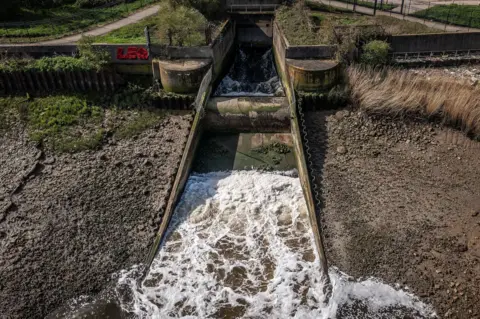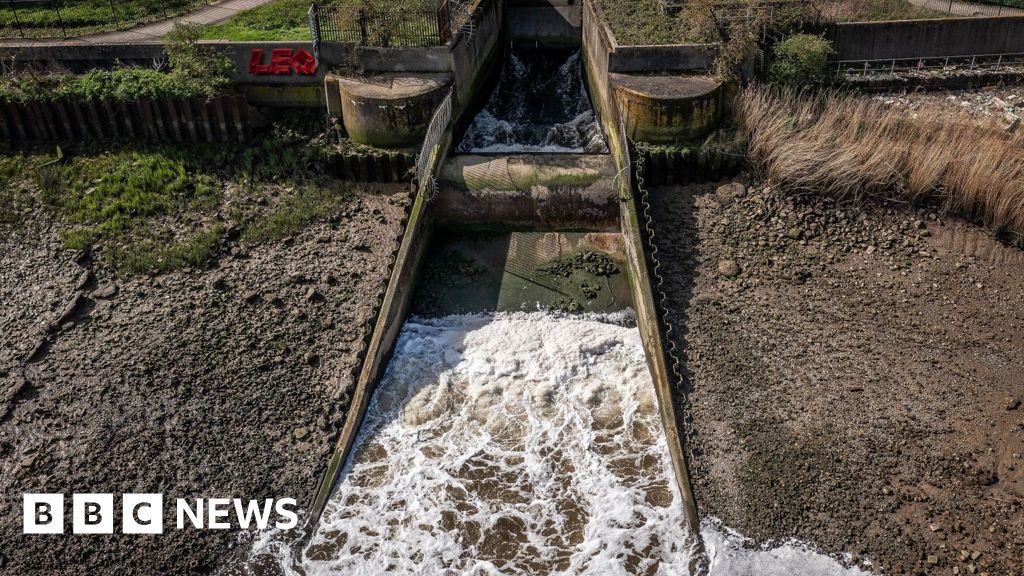 Dan Kitwood/Getty Images
Dan Kitwood/Getty ImagesThames Water, Yorkshire Water and Northumbrian Water face £168m fines by the industry regulator over historic sewage spills.
The proposal will now go to public consultation and is part of Ofwat’s largest ever investigation into water company performance.
The announcement on Wednesday comes amidst growing public anger over the environmental and financial performance of some water companies.
Sewage spills into England’s rivers and seas more than doubled last year.
Ofwat has found that the three companies failed to adequately invest in and maintain their networks, leading to repeated releases of raw sewage into the country’s waterways.
The regulator’s Chief Executive, David Black, said: “Ofwat has uncovered a catalogue of failure by Thames Water, Yorkshire Water and Northumbrian Water in how they ran their sewage works and this resulted in excessive spills from storm overflows.
“Our investigation has shown how they routinely released sewage into our rivers and seas, rather than ensuring that this only happens in exceptional circumstances as the law intends.”
Releasing raw sewage has the potential to significantly damage the environment and poses a risk to human health for those swimming in a river or sea where sewage is being discharged.
In December 2023 Ofwat notified the three companies of its provisional findings and they had the opportunity to provide any further evidence for consideration.
On Wednesday it proposed fines of £104m for Thames Water, £47m for Yorkshire Water and £17m for Northumbrian Water.
Ofwat can fine companies up to 10% of their annual sales. In the case of Thames Water, the proposed fine is 9% of sales, which David Black told the BBC “reflects the severity of the offences”.
The BBC has contacted all three companies involved for comment.
Ofwat continues to investigate a further eight water and wastewater companies in England and Wales for similar issues, with further updates expected in the coming year.
Water companies have been proposing to raise their customers bills by more than 44% over the next five years to pay for improvements in water infrastructure.
Thames Water has argued for an increase of £191 over the next five years but Ofwat has only agreed to £99.
But there has been growing anger from the public that money from customers’ bills is not being sufficiently invested in upgrades.
Earlier this year environmental campaigners called for a ban on executive bonuses if there was evidence of environmental damage and a review of shareholder payouts.
The government is currently consulting on plans to ensure that money earmarked for upgrades cannot be used to pay salaries or dividends.
In reaction to Ofwat’s announcement Secretary of State for Environment, Food and Rural Affairs, Steve Reed said:
“I welcome Ofwat’s action today. The unacceptable destruction of our waterways should never have been allowed – and it is right that those responsible for illegally polluting our rivers, lakes and seas face the consequences.
“This Government will fundamentally reform the water sector.”
The threat of fresh fines will raise questions about how much some companies can afford to invest in infrastructure upgrades.
Thames Water has been struggling with debts of £14.7bn.
It announced last month it only had enough cash to fund operations until the end of May 2025 – and was already at risk of having the credit rating of its debts downgraded.
When asked by the BBC’s Today programme what would happen if companies could not afford to pay the fines or make the upgrades necessary, Mr David Black said:
“We have the power to impose these fines on companies and if they fail to do so then they will effectively defaulting on their obligations. So I am sure we will collect these fines.”

